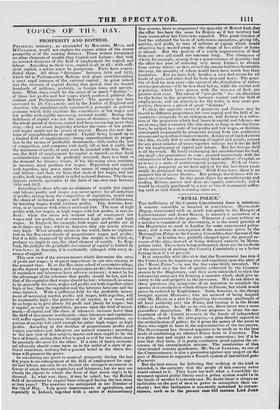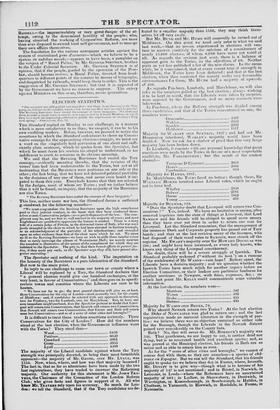"RURAL POLICE."
THE inefficiency of the Country Constabulary force is notorious. A country constable is laughed at everywhere. Marmudake Magog, represented with so much real gusto by the Marquis of LONDONDERRY and JOHN REEVE, is scarcely a caricature of a village conservator of the peace. Whenever a serious robbery or a murder is committed ii) the country, it is the usual practice of the Magistrates to scud to London for some experienced police- man ; and it was in consequence of the assistance given by the Metropolitan Police to the Country Constables, that the cost of the " Force" in London was partially charged upon the general re- venue of the state, instead of being defrayed entirely by Metro- politan rates. These facts being undisputed, there can be no doubt of the necessity of putting the Country Constabulary on a better footing than it is at present. It is ostensibly with this view that the Government has issuol the Como ission for inquiring into and reporting upon the state of the "Rural Police"—to use the fine name lately invented. We have looked over the list of queries addressed by the Commis- sioners to the Magistracy, and they seem calculated to elicit the information necessary for framing a measure which shall give se- curity to life and property in the provinces. We do not detect in these questions any symptoms of an intention to establish the species of centralization which obtains in France, but which would never be endured by Englishmen. Such, however, is the charge brought against Ministers ; who are accused of being leagued with Mr. HOME in a plot for depriving the country gentlemen of all local authority over the Police, and vesting it in the Home Office in London. As far as we can see, there never was a more groundless imputation. Mr. Hume proposes to place the ma- nagement of tho County revenues in the hands of independent Councils, elected by the rate-payers,—a plan directly opposed to the centralization of police; for it gives the power of the purse to those who ought to have it, the representatives of the tax-payers. The Government has directed inquiries to be made as to the best mode of establishing an efficient Police force in Counties. The two plans may and ought to have some connexion ; but if it be true that they have, it is pretty conclusive proof against the ex- istence of the centralization scheme. The nomination of that clear-headed country gentleman, Mr. SWAM/ LEFEYRE, as one of the Commissioners, is also a guarantee against any project on the part of Ministers to organize a French system of centralized gens d'armerie.
But the best reason for believing that nothing of the kind is intended, is the certainty that the people of this country never would submit to it. They know too well what a formidable in- strument against public liberty such a police system would le in the hands of another CASTLEREAGH. No doubt there is always an inclination on the part of men in power to strengthen their au- thority; but this inclination is constantly restrained by circum- stances, such as in the present case will restrain Lord JOHN RUSSELL—the impracticability or very great danger of the at- tempt, owing to the determined hostility of the people; who, having observed the working of Corporation Reform, are more than ever disposed to extend local self-government, and to manage their own affairs themselves.
The foundation for the various newspaper articles against the system of centralized gens d'armeric—which we believe to be a system in nubibus merely—appears to have been, a pamphlet on the subject of" Rural Police," by Mr. GEORGE STEPHEN, brother to the Under Colonial Secretary. Mr. Gscuroz STEPHEN is of opinion, that if the people, goaded by the operation of the Poor- law, should become restive, a Rural Police, directed from head- quarters to different points of the country' by means of telegraphs, and deripatched by railroads, would keep them in order. This is the suggestion of Mr. GEORGE STEPHEN; but that it is approved of by the Government we have no reason to suppose. The outcry against Ministers on this score, therefore, seems groundless.



























 Previous page
Previous page